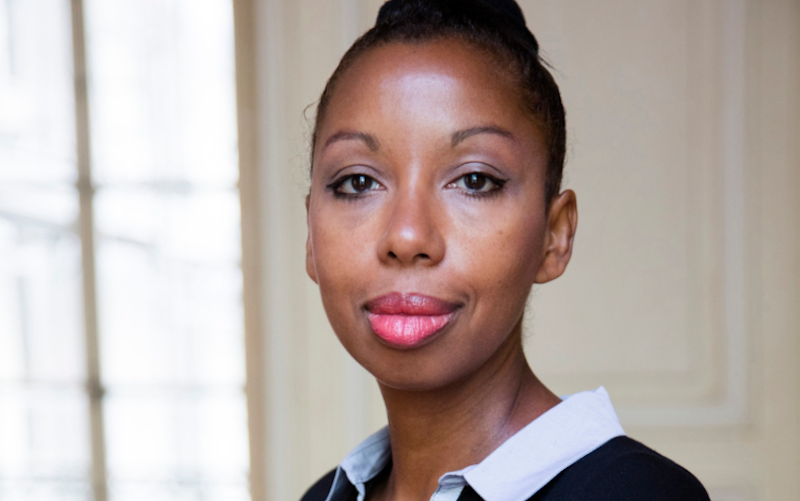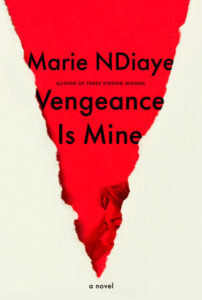
Marie Ndiaye on a Novel's Many Twists and Turns
Jane Ciabattari Talks to the Author of Vengeance Is Mine
Novelist, playwright and screenwriter Marie Ndiaye has had the attention of the French literary world since she published her first novel, As to the Rich Future, at seventeen. Born in Pithiviers, the daughter of a French school teacher mother and a Senegalese father, she won the 2001 Prix Femina for Rosie Carpe and the 2009 Prix Goncourt for Three Strong Women. Her latest, Vengeance Is Mine, is a true crime novel about a mother who has murdered her three children presented as an existentialist monologue by a troubled lawyer who holds onto her worldview with great strength (or stubbornness), even as her home, her relationships, and her body crumble. “I began thinking about this book at the same time as I was working with Alice Diop on the script of her latest film. Saint-Omer,” Ndiaye told me. “That movie is based on a true story that happened in France about twelve years ago: a woman who evidently had no particular problems, a woman who was educated, refined, drowned her sixteen-month-old daughter in the ocean even though she’d cherished her from the moment of her birth. Working on that movie led me to try to understand those ‘excellent mothers,’ loving and devoted, who very deliberately kill their children. As for my book itself, it’s an invented story.” Our email conversation spanned several weeks and many time zones, from Paris to Nebraska (for translator Jordan Stump to work that magic) to Sonoma County.
*
Jane Ciabattari: How have the past three years of pandemic and global turmoil affected you, your work, the translation and launch in the US of this new novel, Vengeance Is Mine? Where have you been living, and how has COVID affected your residence?
Marie Ndiaye: During the confinement I was still living in the country, near Bordeaux. When you live in nature, you don’t have the same perception of what’s going on in the world, everything seems somewhat distant. I lived essentially the way I always do: writing, working in the garden. I was lucky enough not to be affected in any painful way by that time.
I never start writing a novel without having long reflected on an image that, for one reason or another, fascinates me.
JC: The layering of placid conversation, deception, confusion, horror, and journey backward into unclear memory in this novel brings to mind the work of Stephen King. Is he an inspirati? Or Claude Simon, whose investigations are fragmented and searching? (He once noted, “The novelist today tries to make his way through a kind of fog; it isn’t really a question of irony, but one of vertigo: he just doesn’t know the answers.”) Others?
MN: Those are two writers who have an enormous importance to me, for all their differences. Claude Simon taught me, I believe, not to go “straight to the point” in writing to twist and turn around a secret or a mystery that language tries to get as close to as it can—and yet the writer knows he’ll never find the way into that core of darknesses and silences, he can only try to get close enough to knock on the door, and he hears the echo of that knock but he knows the door is not going to open. My favorite Stephen King novel is It. He knows better than anyone how to understand and describe the terrors of childhood. Joyce Carol Oates as well, whom I’ve admired since I was twelve years old. There’s also Anna Maria Ortese, Javier Marias, Russell Banks, Sigrid Undset, so many others!
JC: Vengeance Is Mine is set primarily in Bordeaux, where your narrator, a lawyer we know as Me Susane (no given name), is based, with side trips to nearby La Réole, where she grew up. Your 2005 book Self-Portrait in Green (reissued this year in a hardback edition with Jordan Stump’s translation by Two Lines Press) also is set in this area “eternally under the threat from the floodwaters of the Garonne.” Is this a region of France you know well? Have you lived there?
MN: Yes, that’s the part of France I know best: I lived there for about ten years before I left for Berlin. When I set my characters in motion I need a very precise image of the roads, the streets they’re moving through, even if I don’t necessarily describe them. That’s why I have never, I think, made any character live in a place I haven’t seen.
JC: Your opening is enticing and mysterious. A new client “timidly, almost fearfully” enters Me Susane’s office on January 5, 2019, to request her services on behalf of his wife Marlyne, who is accused of murdering their children. We follow your narrator’s thoughts intimately as she realizes she may have met this man, Gilles Principaux, thirty-two years before in the Caudéran neighborhood of Bordeaux, when she was ten and her mother took her along on a job: “he was the teenager she’d fallen in love with for all time, long ago…” The question Who is Gilles Principaux to me? drives your plot. Did you begin with this opening? Or did it emerge as you worked on the novel?
MN: I never start writing a novel without having long reflected on an image that, for one reason or another, fascinates me. In this case the image was this: a woman—I don’t yet know who she is or what she does in her office—sees a man come in, and him too I don’t yet know who he is or why he’s come to see her, and she’s so shocked that she feels like she’s been struck right in the face. That was the image that made me want to write this novel, like a mystery I had to explore.
JC: M e Susane, her mother and her father have radically different memories of the incident in Caudéran. This conflict in what they recall leads to a rift in the family. It’s as if the unreliability of memory is a character in the novel. Is that what you intended?
MN: M e Susane is fighting off her father’s determination to make her a victim—he’s convinced that in that house she suffered something unnamable (he certainly doesn’t give it a name!). She doesn’t want to be the victim of anything or anyone. And even if it happened the way her father thinks, she’d rather be on the side of her enchanted memories than on the side of the truth.
JC: Me Susane’s housekeeper Sharon, is an undocumented mother of two from Mauritius on whose behalf she is working to get legal papers. You portray vividly the lawyer’s inner turmoil at their relationship, her sense that Sharon pities her and doesn’t appreciate all the efforts she is making on her behalf (and Sharon certainly doesn’t signal that she is superior and admirable, which is what she feels entitled to). Sharon’s role in her daily life grows, yet there is no true connection between them, which makes her feel even more isolated. How can we understand what binds these two strong women whose roles and class place them so far apart?
They both have a right to their own interpretation of the facts, their own account of their lives.
MN: Me Susane’s problem with Sharon is that she feels guilty. She doesn’t know how to be a boss. She mixes up friendship and a work relationship. She wants desperately for Sharon to like her, but Sharon isn’t interested in anything like that. And so M e Susane feels a sort of resentment, because it seems to her that she’s doing a lot to help her housemaid, which is true. But you can’t demand love in exchange for the help you give someone.
JC: Rudy, a former law firm colleague and boyfriend, calls on Me Susane to arrange babysitting for his young daughter Lila, a process that grows increasingly complicated. Is Lila a doppelganger for the younger Me Susane when she first met Gilles Principaux?
MN: Ah, I hadn’t thought of that, but it’s interesting!
JC: Given the range of characters in this novel, how did you decide on the narrative point of view?
MN: I wanted the narrative never to leave the point of view of M e Susane, as strange as that might make it sometimes. I wanted the reader to be literally a prisoner of Me Susane’s mind.
JC: Me Susane’s client, Marlyne, refuses to see her husband (although she does speak at length to her lawyer in a breathless ten-page section). Gilles Principaux rants at Me Susane mercilessly, at one point without noticing she is bleeding from an injury, offering her a first-hand experience of his self-involvement. Me Susane’s sense of horror builds as she begins to understand Marlyne as if from within her stultifying marriage. How is she to know who is the guilty one?
MN: I think she listens to Marlyne’s and Gilles’ respective accounts without really judging either one of them. That was another thing I wanted as I wrote this book: they both have a right to their own interpretation of the facts, their own account of their lives. But the fact remains, it was Marlyne who killed, not Gilles.
JC: How does the translation process with Jordan Stump, the translator of this novel and others (That Time of Year, Self-Portrait in Green)—and this interview—work?
MN: Jordan always asks me a few questions about the text, and from those questions I can see he’s an extraordinary translator: they always show a pertinence, a subtlety, and perceptiveness that fill me with joy and gratitude. Thanks be to translators! Without them how would I have access to literature from all over the world?
__________________________________

Vengeance Is Mine by Marie Ndiaye, translated by Jordan Stump, is available from Alfred A. Knopf, an imprint of Knopf Doubleday Publishing Group, a division of Penguin Random House, LLC.
Jane Ciabattari
Jane Ciabattari, author of the short story collection Stealing the Fire, is a former National Book Critics Circle president (and current NBCC vice president/events), and a member of the Writers Grotto. Her reviews, interviews and cultural criticism have appeared in NPR, BBC Culture, the New York Times Book Review, the Guardian, Bookforum, Paris Review, the Washington Post, Boston Globe, and the Los Angeles Times, among other publications.



















